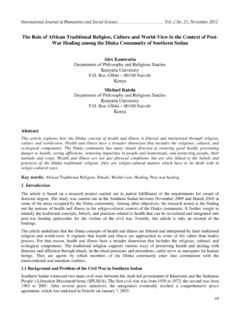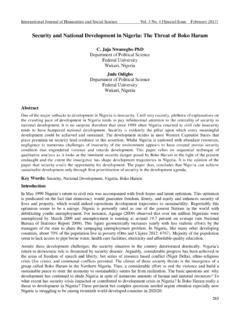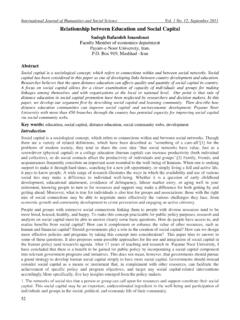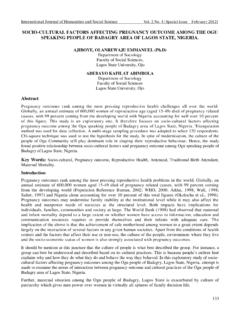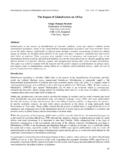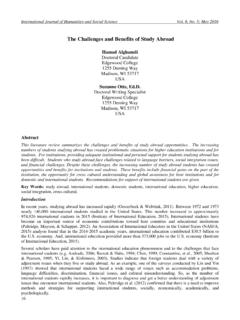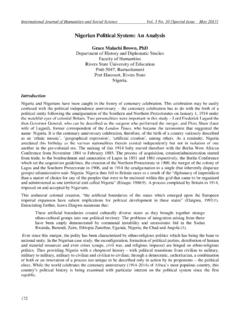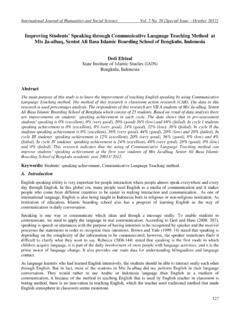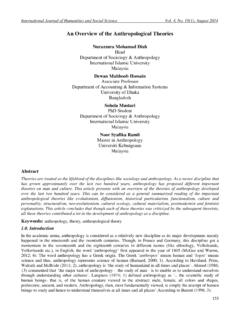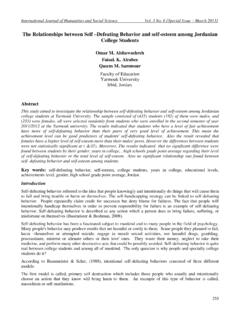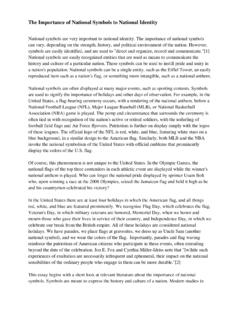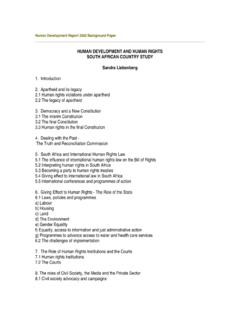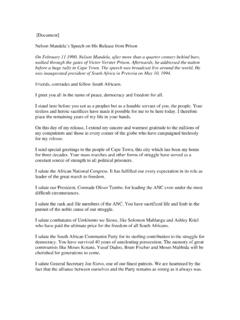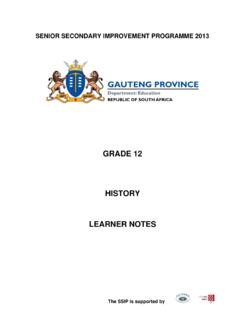Transcription of Mother Tongue Debate and Language Policy in South Africa
1 International Journal of Humanities and Social Science Vol. 3 No. 13; July 2013 39 Mother Tongue Debate and Language Policy in South Africa Dr. Baba P. Tshotsho University of Fort Hare Private Bag X 1314, Alice, South Africa Abstract This paper evaluates the current Mother Tongue debates and the South african Language Policy . The aim of the Policy is to redress the injustices of Apartheid where English and Afrikaans were given a higher status at the expense of other languages. Prior to 1994 English and Afrikaans were used as official languages throughout South Africa . Only students whose Mother Tongue was English or Afrikaans were at an advantage. The majority of South Africans speak an african Language as a home Language . The rest of the population speaks other indigenous languages ( national Department of Education, 1992). All that changed after 1994 when 11 languages were declared official languages and given the same status.
2 This was a way of promoting african languages which were neglected in the past. Provinces were free to choose which of the official languages to declare an official languages at regional level (Barkhuizen and Gough, 1996). The vision of the african national congress (ANC) government of promoting all 11 languages is just a symbolic gesture and is likely to remain so in the forseeable future. The South african government has not yet provided the human resources and physical resources needed to promote multilingualism. Practically speaking, English and Afrikaans still have a higher status than other languages. The value attached to these languages even by blacks themselves, undermines the survival of african Languages. The result is that many black South Africans make English their Language of choice as a medium of instruction (cf. Dyers 2001; De Klerk 2000 and Banda, 2004).
3 This makes prospects for an african Language as an alternative medium of instruction at tertiary institutions appear very bleak, at least in the foreseeable future. This paper argues that Mother Tongue education be considered in South Africa if we hope to get good grades from students who come from rural schools Key words: South african Language Policy , indigenous languages, isiXhosa, medium of instruction, multilingualism. Introduction This paper is on mothertongue education and the South african (SA) Language Policy which was introduced after 1994 when South Africa became a democratic country. Language Policy aims to redress the injustices of Apartheid where English and Afrikaans were given a higher status at the expense of other languages and also to facilitate access to good services, knowledge and information in order to meet client expectations and needs (Eastern Cape Language Policy ). Prior to 1994 English and Afrikaans were used as official languages throughout South Africa .
4 Only students whose Mother Tongue was English or Afrikaans were at an advantage. The majority of South Africans speak an african Language as a home Language . For example, there are about 22% Zulu speakers and 18% isiXhosa speakers while 16% speak Afrikaans and less than 10% speak English as their first Language . The rest of the population speaks other indigenous languages ( national Department of Education, 1992). All that changed after 1994 when 11 languages were declared official languages and given the same status. This was a way of promoting african languages which were neglected in the past. Provinces were free to choose which of the official languages to declare as official languages at regional level (Barkhuizen and Gough, 1996). In the Eastern Cape the official languages are; isiXhosa, Sesotho, English and Afrikaans. These are the dominant languages in the region.
5 IsiXhosa is spoken by , , English , Sesotho and others At the University of Fort Hare their Language Policy aims at elevating and advancing the status of indigenous languages. English and isiXhosa languages have been chosen as the languages of communication and instruction and English has been maintained as the medium of instruction (University of Fort Hare Language Policy ). Center for Promoting Ideas, USA 40 The Bill of Human Rights (section 31) established the notion of languages as a fundamental human right. It states that: i) Every person shall have the right to use the Language of his/her choice. ii) No person shall be discriminated against on the grounds of Language . iii) Every person has a right to insist that the state communicate with him/her at national level in the official Language of his/her choice (Senate sub-committee on languages, 1995).
6 Critical Evaluation of the Policy The vision of the african national congress (ANC) government of promoting all 11 languages is just a symbolic gesture and is likely to remain so in the forseeable future. The South african government has not yet provided the human resources and physical resources needed to promote multilingualism. Practically speaking, English and Afrikaans still have a higher status than other languages. The value attached to these languages even by blacks themselves, undermines the survival of african languages. The result is that many black South Africans make English their Language of choice as a medium of instruction (cf. Dyers 2001; De Klerk 2000 and Banda, 2004). This makes prospects for an african Language as an alternative medium of instruction at tertiary institutions appear very bleak, at least in the foreseeable future. The Ministry of Education is aware of this situation and appears not to be doing anything about it.
7 According to Pandor (2005), the then Minister of Education, stated that English was going to be optional as a medium of instruction, but in the same breath contradicted this position by saying that English was going to remain as the Language of education until african languages were sufficiently developed. Furthermore, in 2004, a representative of the Department of Arts and Culture made a presentation at the South african Linguistic Association Conference (SAALA) stating that the government was trying hard to promote the indigenous languages by funding Language centres in nine (9) tertiary institutions in South Africa . Clearly, funding of tertiary institutions is not enough because the problem is not with funding, but with the poor teaching of african languages at primary and secondary school levels. The problem also lies with the implementation of government Policy . De Klerk, 2002 argues that the official recognition of English as the Language of government and business confirms the power and value attached to English as the lingua franca at government level.
8 In spite of the government Policy of multilingualism, English and Afrikaans remain the only two languages used in tertiary institutions . The DoE has not been able to convince tertiary institutions to use one of the indigenous languages as a medium of instruction and the funds for implementing this option are not likely to be available in the near future. Thus, the functional value of English as the medium of instruction is endorsed and students are obliged to adhere to English in order to progress at tertiary level. Equal opportunity in education is a priority for the government but Language in education has not received the attention it deserves. Research has revealed that Language and achievement are closely linked and the use of English Language as a medium of instruction in South Africa contributes a great deal to the high failure rate and dropout rates among black students (Barry, 1999; Heugh, 2005)).
9 English Language proficiency is essential for students who are expected to complete tasks in English and also tasks in other subjects. The former Education Minister (Bengu, 1996) stated that theoretically, students have a right to education in the Language of their choice. However, it is argued that the practical implementation of this is not feasible in the foreseeable future since there are no books written in the indigenous languages and there is little enthusiasm among african home Language speakers to use indigenous languages as medium of instruction. At present 80% of the South african population choose English as the Language of learning and instruction. English as the Language of choice of the majority of South african students will result in entrenching unequal opportunities to teaching and learning which will invariably undermine the success of bilingualism ( national Department of Education, 1998a).
10 Moreover, in South Africa , the truth is that English is dominating and the government of South Africa is promoting its use as a Language of business, commerce and industry (Ndzimande and Pampallis, 1992). English is regarded as being more important than other indigenous languages. Black parents who send their children to English medium schools also encourage this. At the same time it is clear that the majority of blacks cannot afford this luxury and their children suffer the consequences of not being proficient in English (Mc Donald, 1990). International Journal of Humanities and Social Science Vol. 3 No. 13; July 2013 41 It is also clear that the preference of English undermines the Policy of government to promote equal opportunities in South Africa (Chaka, 1997). In the South african context, black students do not have support structures to develop English Language related skills thus putting them at a disadvantage.
